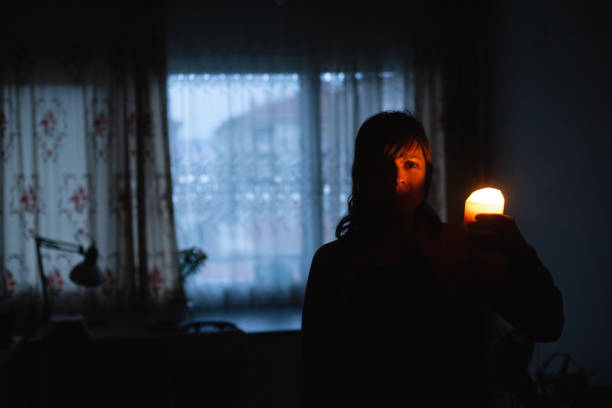Heavy rain, lightning, hail and storms can lead to massive blackouts and you may be looking for blackout protection. Every year, thousands of Australians are left without mains grid electricity – sometimes for several hours or even days.
In some cases, you might experience blackout events also when having a solar panel system installed on your rooftop. The reason is simple: Many solar inverters come with a so-called anti-islanding feature that automatically switches the inverter off when the grid power is lost.
This safety function will prevent electricity from being sent to the grid while the grid is being fixed by electricians attempting to restore the power. If your solar system keeps transferring electricity to the grid, it could lead to the electrocution of workers or grid damage.
However, you might also find solar systems with blackout protection. This way you will have power access during blackouts – at least to some extent.

First: What is a solar battery?
To be able to understand how solar blackout protection works, you will also need to understand what a solar battery actually is. Around one-fifth of all Australians with solar panel systems have a solar battery.
Excess energy produced by your solar panels and stored in a solar battery is available for use when needed. Alternatively transferring excess energy to the grid will get you a feed-in tariff.
If you have a grid-connected solar panel system, you will also be able to import energy if your solar panel system does not produce enough electricity.
What is blackout protection?
Blackout protection is a function that makes it possible for your solar system to supply your household with electricity even if the grid power disappears. In other words, you might use battery-stored solar electricity to power your home appliances during grid blackouts.
Remember, blackout protection is only relevant for hybrid solar systems with a battery and grid connection. To prevent electrocution, solar panels will automatically shut off. This is a legal requirement.
If your solar panel system does not have a battery, you will usually not have access to electricity during a blackout (unless you have a special inverter).
How does solar battery blackout protection work?
Solar batteries with blackout protection will automatically switch to blackout mode and provide your home with power while discharging. Usually, batteries with blackout protection will switch into blackout mode within a couple of seconds in case of a blackout event.
The switchover time can vary from system to system and describes the time it will take for your system to register grid energy interruptions or a blackout before activating the blackout protection. In some cases, the switchover time can be as long as a couple of minutes.
Different batteries might work in different ways. Some may give your home complete blackout protection and offer a 7 kW of battery discharge. Others may only power a few of the circuits in your home, with a load of 2.5 kW or so.
Make sure your solar panel system and inverter are able to handle your home appliances’ energy peak by looking at the battery’s peak output and continuous power capability.
Do all solar batteries have blackout protection?
No, a solar battery does not necessarily have blackout protection. The feature is common in newer, high-quality batteries. If you want blackout protection, you should consider this when installing the system.
A solar battery with blackout protection might cost a bit more than traditional solar batteries. This additional cost might be worth it if power access is very important to you.
How to handle a power blackout without a solar battery?
As solar batteries are very expensive, many Australians with solar panels on their rooftop will not have any power access during blackouts. There are alternatives to consider.
For instance, you might have a gas generator for backup in case of blackouts. This is a relatively budget-friendly option, although it is not the most eco-friendly way to produce energy.
It is also possible to find special solar inverters that will let your solar panels disconnect from the grid and at the same time deliver energy to your home appliances.
Another option is to buy a portable solar generator, which usually won’t cost more than a few hundred dollars.
Should you invest in a solar battery with blackout protection?
If you are planning on getting a solar panel system with battery storage, you might want to choose a model with blackout protection. Just keep in mind that these systems can be quite expensive, so you might want to consider the importance of energy access during blackouts.
For households or businesses with devices that need to work 24/7, blackout protection might be a good investment. If not, you might want to consider cheaper options like a gas generator. Remember, make sure you use a CEC-accredited installer for obtaining quotes.